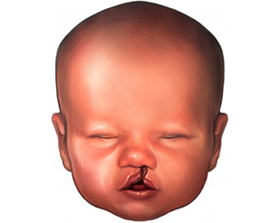 Cleft lip and/or palate occurs in about 1 in 600 births worldwide. These children often encounter difficulties in feeding, hearing, breathing, or speaking and may be affected psychologically as well. How the child copes with these complications can be influenced by how the parent copes.
Cleft lip and/or palate occurs in about 1 in 600 births worldwide. These children often encounter difficulties in feeding, hearing, breathing, or speaking and may be affected psychologically as well. How the child copes with these complications can be influenced by how the parent copes.
The Cleft Palate–Craniofacial Journal relates an “Examination of Mental Health Status and Aggravation Level Among Mothers of Children With Isolated Oral Clefts.” Mothers of 294 children with cleft lip and/or cleft palate completed the Mental Health Inventory and Aggravation in Parenting Scale. The children in this sample were 4 to 9 years of age and born in Arkansas, Iowa, or New York State.
Results from the current study were compared with data from other published studies. No significant differences were found—mothers of children with oral clefts were not more likely to report poor mental health status than parents of unaffected children. Nor did these mothers experience higher levels of aggravation in parenting than those of unaffected children.
However, the study did find that among mothers of children with oral clefts, low sociodemographic factors were associated with reported poor mental health and higher levels of parenting aggravation. Mothers reporting poor mental health were less educated, had lower household incomes, and had lower ratings of their own and their child’s health compared to those mothers who reported good mental health. In addition, mothers with high parenting aggravation levels reported lower household income and a greater number of children than those with moderate or low aggravation.
The psychosocial adjustment of a child with an oral cleft can be affected by the psychological adaptation of the parent or caregiver. A parent who experiences anxiety, stress or depression in the developing child’s early stages may negatively influence the child. Parents can adapt to the needs of an oral cleft child by seeking social support and applying coping and adjustment strategies.
Screenings for mental health and parenting during routine appointments could identify parents who are at-risk. Referrals to mental health providers and community outreach programs could potentially help these parents cope and reduce the negative impact on their child.
Full text of the article, “Examination of Mental Health Status and Aggravation Level Among Mothers of Children With Isolated Oral Clefts,” Cleft Palate-Craniofacial Journal, Vol. 51, No. 4, July 2014, is available at http://cpcjournal.org/doi/

Leave a Reply